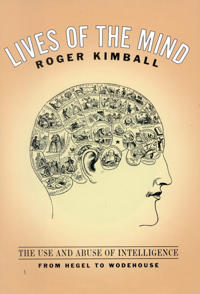Physics and Politics (Pocket)
avWalter Bagehot, Roger (EDT) Kimball, Roger Kimball
ISBN: 9781566632218 - UTGIVEN: 1999-04One of the great short masterpieces of nineteenth-century thought, Physics and Politics is in essence a brilliant essay in social psychology. It defines with grim humor the conditions of stability and social progress. "Physics" in Bagehot's book, refers to natural science; "politics" to social scien[...]
Under omprövning : en antologi om konst, kanon och kvalitet (Inbunden)
avThomas Steinfeld, Peter Luthersson, Theodore Dalrymple, Axel Odelberg, Karin Stensdotter, Roger Kimball, Johan Lundberg, Roger Scruton
ISBN: 9789173534642 - UTGIVEN: 201109Under omprövning rymmer ett stort antal bidrag som förenas av att de utifrån ett kritiskt perspektiv diskuterar vår tids mest karakteristiska estetiska hållningar och konstnärliga tendenser. Antologin försöker se framåt, förbi de modernistiska och postmodernistiska strategier som kännetec[...]
Art's Prospect (Inbunden)
avRoger Kimball
ISBN: 9781566635097 - UTGIVEN: 200307Most of the really invigorating action in the art world today is a quiet affair, Mr. Kimball observes. It usually involves not the latest thing but permanent things-they can be new or old, but their relevance is measured not by the buzz they create but by the silences they inspire. With reviews and [...]
Lives of the Mind (Pocket)
avRoger Kimball
ISBN: 9781566635240 - UTGIVEN: 2003-12"In the faculty of writing nonsense," the English critic Walter Bagehot once observed, "stupidity is no match for genius." In Lives of the Mind, Roger Kimball, one of the best of our cultural critics, offers a lively and penetrating study of genius-and pseudo-genius-at work and investigates the use [...]
Tenured Radicals (Häftad)
avRoger Kimball
ISBN: 9781566637961 - UTGIVEN: 200809Since Tenured Radicals first appeared in 1990, it has achieved a stature as the leading critique of the ways in which the humanities are now taught and studied at American universities. Trenchant and witty, it lays bare the sham of what now passes for serious academic pursuit in too many circles. In[...]
The Fortunes of Permanence: Culture and Anarchy in an Age of Amnesia (Inbunden)
avRoger Kimball
ISBN: 9781587312564 - UTGIVEN: 201206"Cultural instructions." Everyone who has handled a package of seedlings has encountered that enigmatic advisory. This much water and that much sun, certain tips about fertilizer, soil, and drainage. Planting one sort of flower nearby keeps the bugs away but proximity to another sort makes bad thing[...]
The Long March (Pocket)
avRoger Kimball
ISBN: 9781893554306 - UTGIVEN: 2001-07In The Long March, Roger Kimball, the author of Tenured Radicals, shows how the "cultural revolution" of the 1960s and '70s took hold in America, lodging in our hearts and minds, and affecting our innermost assumptions about what counts as the good life. Kimball believes that the counterculture tran[...]
The Rape of the Masters (Inbunden)
avRoger Kimball
ISBN: 9781893554863 - UTGIVEN: 2004-04This book exposes the charlatanry that fuels much academic art history today and leaks into the art world generally.[...]
Ideas Have Consequences (Pocket)
avRichard M. Weaver, Roger (FRW) Kimball, Richard M. Weaver
ISBN: 9780226090061 - UTGIVEN: 2013-11Originally published in 1948, at the height of post-World War II optimism and confidence in collective security, Ideas Have Consequences uses "words hard as cannonballs" to present an unsparing diagnosis of the ills of the modern age. Widely read and debated at the time of its first publication, the[...]
Darwinian Fairytales (Pocket)
avDavid C. Stove, Roger (INT) Kimball, David C. Stove
ISBN: 9781594032004 - UTGIVEN: 2007-04Whatever your opinion of 'Intelligent Design,' you'll find Stove's criticism of what he calls 'Darwinism' difficult to stop reading. Stove's blistering attack on Richard Dawkins' 'selfish genes' and 'memes' is unparalleled and unrelenting. A discussion of spiders who mimic bird droppings is alone wo[...]
Suicide of the West (Pocket)
avJames Burnham, John (FRW) O'Sullivan, Roger (INT) Kimball
ISBN: 9781594037832 - UTGIVEN: 2014-11James Burnham's 1964 classic, Suicide of the West, remains a startling account on the nature of the modern era. It offers a profound, in depth analysis of what is happening in the world today by putting into focus the intangible, often vague doctrine of American liberalism. It parallels the loosely [...]













